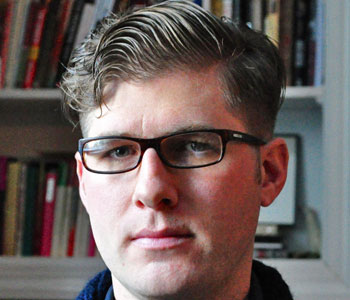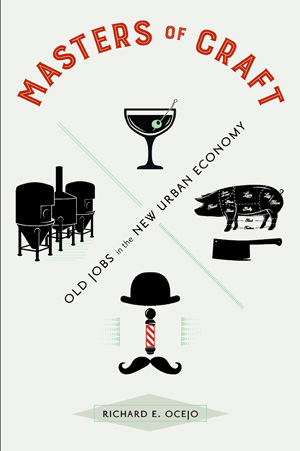
Many blue-collar, manual labor, and service jobs that were once low-status have become “cool” in today’s economy. In fact, jobs like bartender, distiller, barber, and butcher have gone from providing basic services and making mundane products to being cultural tastemakers and influencers. It is elite versions of these jobs, namely cocktail bartenders, craft distillers, upscale men’s barbers, and whole-animal butchers, in hip businesses that are shaping consumer choices in cities across the country.
The most fascinating part of this shift is who has been doing the shifting, or who has been pursuing these jobs. It’s mostly young people with other options for work, like college graduates and people with good jobs in other fields. They want to work in these jobs, and pursue them as careers. And they do so at a time when the economy is largely knowledge- and technology-based, and when jobs in high-end service and creative industries are among the most valued and desired.
At its most general, my book addresses the question: why do people choose the jobs that they do? Specifically, why do people who have the choice to do so refrain from pursuing good jobs in today’s economy and instead take up typically low-status trades?
I found a few key explanations. Primarily, they pursue the elite versions of these jobs because they allow them to use their heads, hands, and social skills. Like much knowledge-based work, these jobs require workers to use cultural information to be creative. Unlike it, however, they get to do so by using their bodies to perform craft-based tasks and provide tangible products and services. Finally, they also get share this knowledge with consumers. Thus, these attributes give these jobs greater status than they normally have. They become knowledge workers who get to learn a craft and directly serve the public.
Readers of Masters of Craft will learn about the unique history and characteristics of each of these four jobs, workplaces, and industries, and the common features of these workers. Underlying the text is the tension between the positive revival and added social benefits of these jobs, and the negative exclusivity that surrounds them: the people who would most benefit from these jobs—people from working-class and low-income backgrounds—do not get them.
There are three broad forces occurring in society today that in concert are leading to these jobs becoming cool. First, how we classify taste is shifting. Consumers are questioning what makes traditionally “highbrow” products and services elite, while elevating typically “low-” and “middlebrow” ones to a higher status. They are often seeking out more “authentic” products, or products that are handmade, artisanal, “local,” tell a story, and provide an experience through their consumption. These workers all provide such products and services.
Second, many gentrifying neighborhoods in cities are resembling new versions of the “urban village” model of the industrial era. In other words, they are becoming self-contained places where incoming middle-class residents can fulfill their daily needs at community staples, like bars, liquor stores, barbershops, and butcher shops. Except these versions offer high-end products and unique experiences aimed at young people with disposable income. They are also becoming cultural destinations for visitors from around the city, and even around the world.
Third, work today is undergoing profound changes. Today’s economy is knowledge- and technology-based, many industries and jobs are very unstable and precarious, and workers often must absorb a lot of risk from their employment and must increasingly brand themselves. Some young workers who feel disaffected by this environment are seeking out alternative career paths, such as these seemingly stable, traditional manual labor jobs. Young people today also get taught that what they pursue as a career should be personally fulfilling and meaningful, rather than merely for earning money. People pursue these jobs because they have a passion for them, and they give them an identity they are proud of.
In my career, I have focused on the relationship between culture and the economy in today’s cities, and how urbanites deal with and respond to this relationship in their everyday lives. I was examining nightlife scenes in gentrifying neighborhoods in New York City when I came upon some of these high-end cocktail bars. My discovery led to an interest in the city’s cocktail community, especially the people who devoted so much of themselves to learning about and making cocktails: the bartenders. I gradually gathered more cases until I had what I felt was an illustrative set for understanding a fascinating phenomenon: traditional blue-collar jobs that had become “cool,” largely due to cultural and economic in today’s cities.
I am also a qualitative sociologist, and use ethnographic fieldwork as my primary research method. In short, I prefer to hang out with the people I study in their natural environments. My questions therefore always revolve around what I can observe people actually doing. These workplaces allowed me to both see and participate in the action.
If a reader were to casually pick up the book, I would hope they would flip to Chapter 7, which is called “Service Teaching.” This chapter focuses on the three service jobs I studied, the cocktail bartenders, upscale men’s barbers, and whole-animal butchers and butcher shop workers. It vividly shows the interactive service work these workers do, and the important role they play in both creating and teaching taste.
“Service teaching” refers to education through service. These workers all have a very democratic understanding of taste, meaning they think that everyone should have access to their high-quality offerings, and that everyone is capable of appreciating them. They also see teaching people about their own taste and the unique qualities that make what they do “good” as an integral part of their jobs. They look for opportunities to reach consumers.
The first part of service teaching is when workers figure out the “types” of consumers they encounter. They place consumers into one of three types, which they base on their initial interactions with them when they first walk into their business. Consumers are “experienced,” “curious,” or “lost.” The first group are people who either know what they want and/or are regulars, the second group show a desire to get lured into the taste world and learn more about their own taste, and the last group is some combination of being habit-bound, uninformed, misinformed, unable to express what they like, are perhaps intimidated by what these businesses and taste worlds are all about, and in the case of barbers, are insecure about their appearance. Figuring out the “type” of consumer they are dealing with guides these workers in how they serve them.
With any type of consumer, these workers are looking for ways to expand their tastes and enhance their existing knowledge. They look for opportunities, such as hints or clues that reveal what people like, to match them with a product or style that will suit their sensibilities. These usually come in the consumer’s order, but these businesses are also designed to get consumers curious, such as the array of rare bottles behind a cocktail bar and the unusual cuts of meat in a whole-animal butcher shop’s display case.
While it seems like these workers are providing their consumers with a wholly original product or service, in fact they rely on established choices that have worked for them before, such as a cocktail that people with certain tastes tend to enjoy. They essentially use scripts of their own making to interact with consumers. As such, they expect consumers to play the role of a “good consumer,” or someone who will listen to what they have to say.
Workers get frustrated when consumers don’t follow the script, such as by challenging their expertise, disagreeing with them, and not taking their advice. They are “lost” consumers, who, these workers feel, will not join their taste world.
I ultimately want readers to think about what work looks like today and why people pursue the jobs that they do. Creative jobs, knowledge work, and high-end services are the most sought-after occupations in our economy. But an impressive number of people who we would expect would want a more conventionally high-status, high-thinking job are instead choosing traditionally low-status ones that require manual labor. Of course, they only want the versions of these jobs that allow them to think and be creative, which enhances their status. And while we usually—and understandably—equate a job’s status and quality with how much it pays, these workers show that a “good” job need not be the highest paying, but the one that gives workers other kinds of rewards, such as positive psychological feelings.
But I also want readers to think about why some people get to pursue certain jobs while others have difficulty doing so—especially ones that seem like they should be open to everyone. If having a college degree (or having the opportunity to get one) isn’t generally a requirement for getting one of these jobs, then why do so many of the people I studied have one (or have some higher education experience)? A college education provides people with both social capital, or social networks and relationships, and cultural capital, or sets of behaviors and knowledge, both of which are necessary for people to get these specialized jobs. Owners of these businesses, who are all well-educated, tend to hire people who are similar to them in terms of background and appearance. People get and keep these jobs because they hear about them through their social networks or they simply know how to look for them, how to present themselves to owners and managers, and how to interact with their colleagues and consumers.
People who lack these forms of capital struggle to get, keep, and excel in these jobs. These are typically people from low-income and working-class backgrounds and/or people of color. Employers don’t discriminate against these groups, but their absence from these businesses is a reality. The problem is that people from these populations would benefit the most from these jobs. My hope is that readers recognize this small, but interesting, form of workplace inequality happening in these cool jobs that limit their potential to transform manual labor and much service work today.


Richard E. Ocejo is Associate Professor of Sociology at John Jay College and the Graduate Center of the City University of New York (CUNY). He is the author of Masters of Craft: Old Jobs in the New Urban Economy (Princeton University Press, 2017), featured in his Rorotoko interview, and of Upscaling Downtown: From Bowery Saloons to Cocktail Bars in New York City (Princeton University Press, 2014). His work has appeared in such journals as City & Community, Poetics, Ethnography, and the European Journal of Cultural Studies. He is also the editor of Ethnography and the City: Readings on Doing Urban Fieldwork (Routledge, 2012) and serves on the editorial boards of the journals Metropolitics, Work and Occupations, and the Journal for Undergraduate Ethnography.